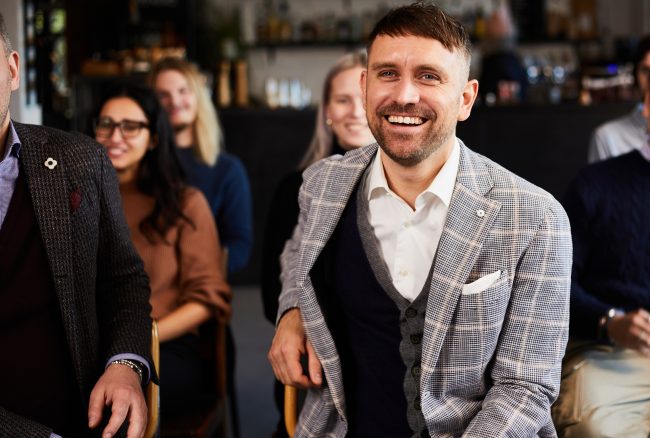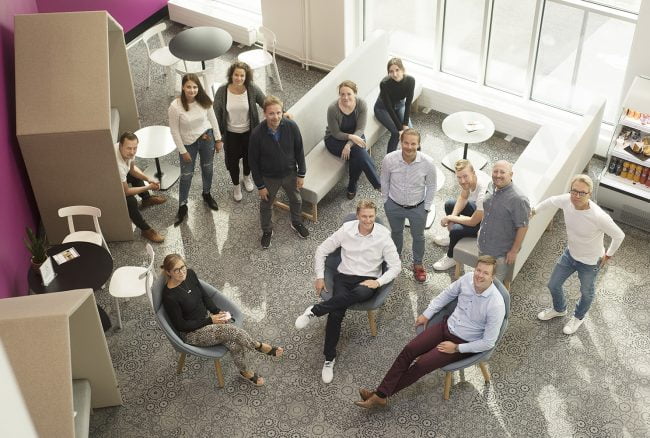Facilitation increases event impact.
“The traditional way of throwing a B2B event is to make the guests listen to other people. You have your keynote, panel and round table, maybe spiced up with a message wall. It can work, but you can’t attract discerning target groups any more by offering the same nice content as everyone else”, says Woltti Group Business Director Jarkko Kivikoski.
If you want to offer interesting and relevant content for senior management or sought-after top experts, the best way is to lay the groundwork and then have them work together.
“When experts work together, they create content, discussions and observations that the organiser could never achieve, even with the best of planning”, Kivikoski says.
Facilitated events benefit the participants
Facilitation means directed planning in a group, frequently used in workshops. One way of making facilitation a part of your company event is to hold a workshop. At its most intensive, the whole event can consist of facilitated content. There are numerous facilitation methods available, some more suitable than others depending on the size and type of audience and their greatest benefits are reflected in the feedback given by the guests.
“We have noticed that guests feel the content of facilitated events to be more diverse than usual. In particular, the participants have given praise for the genuine networking enabled by facilitation”, Jarkko Kivikoski says.
Most guests also find “analogue work” refreshing in contrast to all the digitality: we tend to use pen and paper and draw on flip charts instead of watching slides.
Careful planning is the key to successful facilitation
In a workshop-format event, the participants create the content. But this does not mean that you don’t need to design the content, but exactly the opposite. To be interesting, the themes and perspectives of a facilitated event require careful planning according to the needs and interests of the target group. After all, the draw of such events is created by carefully chosen and themed topics instead of star speakers.
“The greatest difference to arranging a speaker- and programme-oriented event is that a facilitated event takes a lot more time to prepare. Careful preparation of the event, topics and facilitation is essential, and most of the organiser’s effort is spent on planning”, Jarkko Kivikoski says.
The core of a facilitated event consists of finding solutions to issues and challenges interesting to the participants. That’s why the subjects have to be genuinely relevant to the invitees and the facilitated solutions need to provide concrete benefits to them.
“You should always have the invitees contribute to the choice of topics”, Jarkko Kivikoski says. “A preliminary survey or interview can reveal subjects that the organising company never could have discovered on its own. You should not design the content purely from the needs of your own company.”
Participation engages challenging target groups
What types of events is workshopping and facilitation suitable for then?
“Facilitation can give genuine added value to an event with a challenging subject or target group: such as busy decision-makers or staff that are not committed to the subject at hand. When you involve people in the work, they become more committed”, Jarkko Kivikoski says.
“On the other hand, you should forget about facilitation if there is no time for its preparations and implementation, or if the most important thing is to convey information efficiently. In a three-hour breakfast seminar, facilitation can easily become a superficial post-it exercise”, Kivikoski says.
However, an engaging method can be just the hook senior managers and other busy decision-makers need to attend the event. The possibility for genuine networking and expanding one’s own horizons by working with the other participants are attractive prospects for them.
To the organiser, on the other hand, facilitation offers meaningful, diverse and collaborative content and business ideas, with the participants already invested in their development.
Three tips for successful facilitation
- Reserve enough time for careful preparations and a personal invitation process.
- Engage all guests with the event in advance by determining which topics are relevant and interesting to them.
- Create a safe space with an atmosphere of trust and motivation between the participants.
What conference is not a conference at all? Read the success story of an event for senior energy executives and decision-makers, with all of the content produced by the participants.
Would you like to know more? Contact us jarkko.kivikoski@wolttigroup.fi









